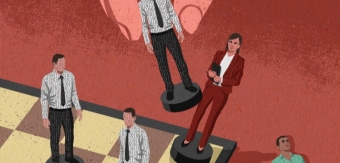References to the 'high-street' in political and sociological debate have been frequent for well over a decade now. Sadly, mentioning a problem frequently doesn't bring solutions. Many towns are plagued by empty retail units on their central thoroughfares, initially prompted by the popularity of 'out-of-town' shopping and then made worse by the economic collapse of 2008. The dying high-street is never far from the agenda of local and national government, largely because it is a highly visible measure of the success, or otherwise, of people's locality. Perhaps predictably, politicians have opted for a celebrity led report in the shape of the Portas Review, but the impact has been all but invisible. And now, there are stirrings of dissent. Some are suggesting we no longer need the traditional high street at all.
Online retail took many years to gain a foothold (remember the dot com bubble?), but now it has, its rise has been inexorable. Owners of brick-built shops complain it is almost impossible to compete with websites - and they're right, it is. So, while well-intentioned consultants and planners dash about trying to save the high-street, Amazon, iTunes and eBay have been making hay. Which has led to special pleading. Recently Justin King of Sainsburys called on the Government to impose the same business rates on websites which are carried by physical stores. Of course, he naively fails to realise that many retail websites are not even hosted in the UK, so his proposition is flawed from the start. Besides, hobbling digital retailers in the UK is hardly a recipe for economic recovery.
It's understandable that many people (not least of all the shopkeepers) will feel sentimental about the local high street. Anyone over the age of 30 remembers their local parade with fondness, and those of my age will recall the family baker, butcher, fishmonger and newsagent. But sentimentality holds no water in a business setting - we cannot prop up a retail model which consumers don't really want, simply because we are nostalgic for the shops of the past.
Some high street businesses have worked hard to re-imagine the physical shopping experience - Apple is one example of success in this area - but sadly, many retail brands have simply lumbered on, changing little since the rise and rise of the web. HMV paid the price for failing to adapt rapidly enough, resembling noisy warehouses in their dying days. I suspect many chains are set to follow. Unfortunately, modern high street shopping tends to be a woeful experience, riddled with poor service, disappointing stock and uncompetitive pricing. That is not the fault of the consumer, but the retailer. However, even if these issues were fixed overnight (which they won't be), it is neither possible nor desirable to turn back the tide. Increasingly, other than for immediate or convenience purchases, UK consumers turn to the web to spend their disposable income. Once the habit of shopping on a smart phone really gains traction, the game is really up.
The complaint is that our high streets are now just packed with charity shops and coffee outlets. Well, that's the way consumer forces have driven them. Complaining is futile. What is needed is a re-imagining of the spaces which were once occupied by tills and shelves. It's not impossible for our high streets to become centres of leisure; places to relax and interact. This needn't mean more coffee shops. How about reading rooms, with laptops and lunches? Or mini-spas, with affordable personalised treatments? I'm a writer not a retailer, so I'm sure those with more of a bent for selling could improve on my simplistic suggestions - but you get the idea.
Abandoning the concept of the old-style high street isn't the same as inviting town centres to become ghosts. It simply insists that we accept the whole retail model has changed irrevocably and a revolution as profound as the internet is required in the high street. Otherwise we'll be stuck in a pattern of decline and complaint.
Magnus Shaw is a writer, blogger and consultant







Steve Mulvey July 26th, 2013, in the morning
Hi MagnusWhat sort of high street are you referring to? Is the big city centre Oxford Street type places, that are little more than outdoor shopping malls. Or real fully functional actual high streets you can find all over Britain?
Where I live, Newport Pagnell, the high street is a source of great pride. The local Butchers has a queue out the door on some Saturday mornings, it has a Costa, which is popular but there is also lots of little inde places. The Picturehouse Cafe occupies the old 30's style cinema and now serves killer breakfasts on a sat morning. We decided to live here not only because of the high street and its convenience but because of the summer fates, soap box derby, beer festivals, parades, the Aston Martin x Bonham auction, Xmas lights event... The list goes on. Also these events are packed which means the pubs & cafes along the street are packed. It seems like great business, I have yet to meet a grumpy publican or cafe owner down our street.
So if you are mainly referring to the big 'high street' brand names then meh... personally I'm not too worried about them. I do agree that serious innovation is required to refresh the experience, especially from someone like me who'd rather give their money to the friendly small business owners down my street.
However when I go to the Milton Keynes shopping centre I don't see empty units and it always seems packed, so maybe that's the exception?
Thanks!